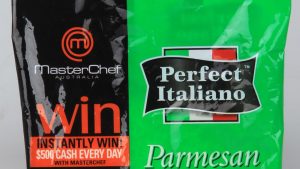
The French-owned company behind some of Australia’s biggest dairy brands has been fined almost $950,000 for breaching the industry’s code of conduct.
Key points:
- The penalty is the first of its kind in Australia
- The ACCC says the outcome “sends a message to the wider industry”
- Farmers say the code has levelled the playing field with processors
Lactalis (which took over the majority of Parmalat in 2011), and owns Pauls, Vaalia, Ice Break, and Lemnos, was found guilty of breaching the mandatory Dairy Code of Conduct in the Federal Court last year.
It was the first contested proceeding under the code, which was introduced by the federal government in 2020 to promote fair trading between farmers and the companies that process their milk.
The Australian Competition and Consumer Commission (ACCC) successfully took action over agreements offered to dairy farmers in 2020 that allowed the company to unilaterally terminate them if they determined farmers had engaged in “public denigration of processors, key customers or other stakeholders”.
The court also found that Lactalis had breached the code by failing to publish its milk supply agreements on its website, and instead required farmers to sign up to receive their milk supply agreements by email.
ACCC deputy chair Mick Keogh said the fine demonstrated the consequences of a breach.
“We took action because we considered Lactalis’s conduct would reduce transparency in the industry and served to perpetuate systemic bargaining power imbalances between processors and farmers,” he said.
“It sends a message to the wider industry that the dairy code is important and [processors] do need to comply with it and make sure they treat farmers fairly in their dealings.”
Mr Keogh said the outcome was unlikely to affect consumers or retailers, but it reinforced pricing transparency under the code.
“We think that’s quite important to establish and maintain a competitive market for farmers’ milk,” he said.
‘Significant consequences’
Matthew Trace, the president of eastAUSmilk, which advocates for dairy farmers in New South Wales and Queensland, has welcomed the fine.
“I think it shows that the Dairy Code of Conduct needs to be taken very seriously by milk processors and, in particular, compliance is extremely important,” he said.
“If any processor has tried to be a bit tricky with how they are complying, or simply lax in their efforts to comply, clearly there will be significant consequences.
“It certainly has levelled up the playing field between farmer and processor.”
Mr Trace said Lactalis had increased the price it paid to farmers this financial year after initially offering a milk price lower than last year.
In a statement, Lactalis Australia said it fully supported the Dairy Code of Conduct, that the breaches related to the first year of the code’s application, and that no allegations had been made by the ACCC in subsequent years.
“Lactalis notes the penalty reflects the Federal Court’s previous findings that the breaches were unintentional and technical only in nature,” the statement said.
“Lactalis maintains the breaches were not a deliberate attempt to gain any kind of advantage in our contractual milk supply arrangements with Australian dairy farmers.
“As one of Australia’s largest dairy processors, Lactalis Australia remains fully committed to the future of the Australian dairy industry.”
The Dairy Code of Conduct is being reviewed by the federal government.
Mr Trace said that he hoped it would be amended to include the relationship between processors and retailers.

























